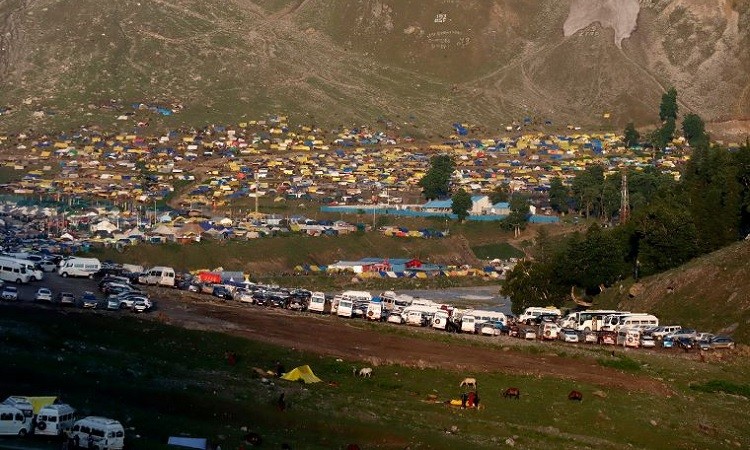
Srinagar: Nestled at an astonishing altitude of 13,000 feet above sea level, the historic 62-day annual Amarnath Yatra is presently underway in Gupha. Embarking on this sacred journey, which commenced on July 1, 2023, offers two distinct paths. The first route, spanning 48 kilometers, meanders through Nanwan-Pahalgam in the enchanting Anantnag district, while the second, 14 kilometers in length, traces its way from Bal Tal, nestled in the captivating Ganderbal district. This pilgrimage serves as a remarkable testament to the coexistence of diverse communities, fostering communal harmony and embracing the spirit of brotherhood.
The Amarnath Yatra transcends the boundaries of religion, drawing pilgrims from various faiths across India and even beyond its borders. A tapestry of devotion, this unique pilgrimage entails individuals of one religious affiliation undertaking a sacred expedition to Gupha, where fellow devotees from different religions graciously assist them on their journey, offering unwavering support and essential provisions along the way.
The Amarnath Yatra route thrives with the presence of Muslim horse-drawn carriages, punis, and pithus. Additionally, Muslims have erected numerous rest points, serving as anchors throughout the pilgrimage. Hailing from the regions of Poonch, Rajouri, Reasi, Kishtwar, and Doda in Jammu province, a multitude of Muslim laborers ardently participate in the Yatra, shouldering the roles of puniwalas, pithuwalas, and palkiwalas.
Along the scenic banks of Nala Indus, extending from the base camp in Bal Tal of Ganderbal district to Gupha, Muslims have established quaint kiosks at various intervals. These humble establishments play a pivotal role in providing essential local services to Amarnath pilgrims during their annual sojourn. Moreover, the local Muslim community serves as compassionate guides, offering their assistance in navigating the sacred path, ensuring the safe passage of pilgrims. Witnessed with awe, these dedicated individuals carry the weary pilgrims on their shoulders or in palanquins, traversing the challenging terrain while braving perilous conditions such as rain, scorching heat, humidity, and muddy paths leading to the revered cave. With unwavering dedication, these local service providers, including the pooniwalas and palanquin bearers of Amarnath, tirelessly endeavor to ensure the pilgrims' safety and comfort throughout their arduous journey.
Year after year, thousands of Muslims enthusiastically join the pilgrimage, dedicating themselves as laborers, pathwalas, and palanquin bearers. Their selfless assistance aids elderly pilgrims in conquering the treacherous Baltal route to the sacred cave, transporting them on palanquins. Additionally, hundreds of locals from Kashmir set up vibrant stalls at the Yatra base camps in Baltal, nestled in the serene Ganderbal district, and in Pahalgam, gracing South Kashmir. These stalls offer a delightful array of goods, not only fostering commerce for the locals but also strengthening the bond between the people of Kashmir and the visiting pilgrims.
In essence, the Amarnath Yatra serves as an extraordinary testament to the profound harmony and camaraderie shared among individuals of diverse backgrounds, transcending religious boundaries.
The Enchanting Amarnath Cave: A Spiritual Odyssey to Lord Shiva's Divine Abode